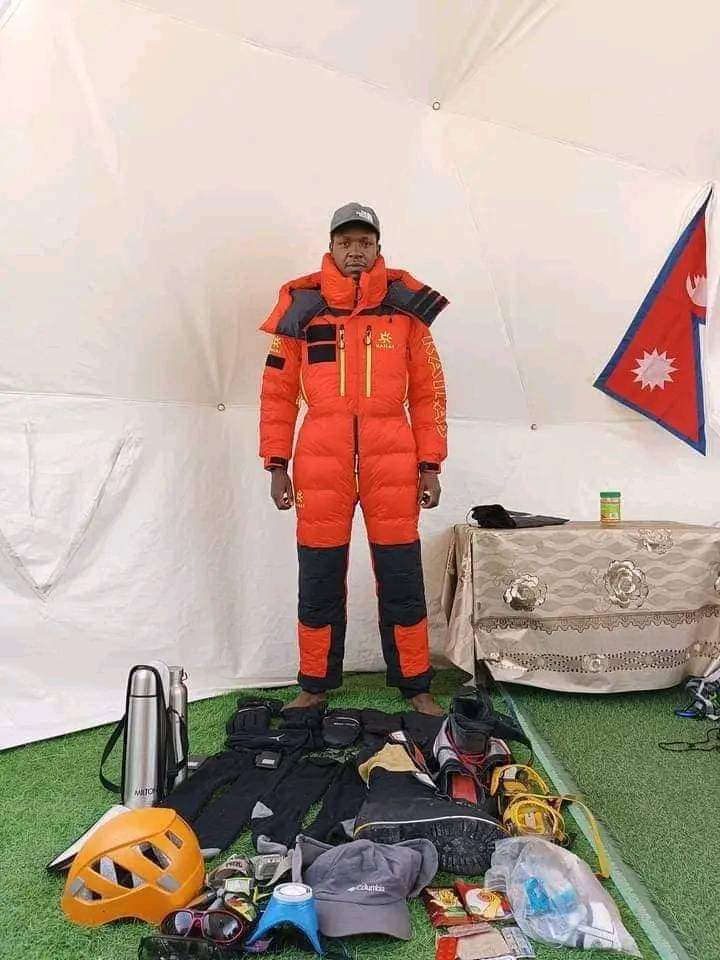The family of Cheruiyot Kirui, a Kenyan banker who tragically lost his life while scaling Mount Everest, has made the difficult decision not to repatriate his body to Kenya. This conclusion came after extensive consultations and careful consideration of the risks involved in retrieving his remains from the perilous slopes of the world’s highest mountain.
Despite the profound grief that accompanies their loss, the family has found a sense of solace in knowing that Cheruiyot’s final resting place is on Mount Everest, a place that held a deep significance for him.Cheruiyot Kirui’s passion for mountaineering was well-known among those close to him. His adventurous spirit and determination to conquer the highest peaks symbolized his larger-than-life persona and his relentless pursuit of personal challenges.
Everest, in particular, was not just a physical challenge for Cheruiyot; it represented the pinnacle of his mountaineering dreams. It was a place where he felt alive, where the magnificence of nature intersected with the limits of human endurance. For Cheruiyot, standing atop Everest was a lifelong ambition, a testament to his strength, courage, and unwavering resolve.
The decision not to repatriate Cheruiyot’s body was not made lightly. The family engaged in comprehensive consultations with experts in mountaineering and high-altitude recovery, as well as with officials and other climbers who had experienced the harsh realities of Everest. The retrieval of bodies from the mountain is fraught with danger.
The severe weather conditions, treacherous terrain, and the high altitude all contribute to the considerable risk involved. These factors make the task not only perilous but sometimes logistically impossible. Furthermore, the high cost and the potential for further loss of life during such a mission added to the complexity of the decision.
Given these formidable challenges, the family ultimately determined that the risks far outweighed the benefits. Their primary concern was the safety of those who might attempt the recovery. The treacherous conditions on Everest have claimed many lives, both climbers and rescuers, and the family did not want to contribute to further loss or endanger more lives in an attempt to bring Cheruiyot home.
This pragmatic perspective, though heartbreaking, underscores the family’s respect for the mountain’s unforgiving nature and their acceptance of the reality of Cheruiyot’s final resting place.In the face of this profound loss, the family has drawn comfort from the fact that Cheruiyot’s last moments were spent in a place he cherished deeply. Everest was not merely a physical challenge for him; it was a symbol of his adventurous spirit and his passion for life.
Knowing that he rests in the very environment that he loved and dedicated himself to provides a form of peace amidst their grief. The mountain that took Cheruiyot’s life is also the mountain that gave him immense joy and fulfillment. This duality offers a poignant reminder of the complex relationship between human aspiration and the natural world.
Cheruiyot’s legacy extends beyond his achievements as a banker and a mountaineer. His story is one of inspiration, reflecting the relentless pursuit of dreams despite the inherent risks. It is a narrative that encourages others to live fully and passionately, embracing challenges and pushing boundaries. While his physical presence will be deeply missed, Cheruiyot’s spirit endures in the memories of his loved ones and in the legacy of his remarkable life.
The family’s decision not to repatriate Cheruiyot Kirui’s body from Mount Everest is a testament to their deep understanding of the mountain’s dangers and their respect for his passion. Their acceptance of his final resting place on the slopes of Everest is a powerful statement of love and acceptance. Cheruiyot Kirui’s story, marked by courage and a zest for life, will continue to inspire and resonate with many, serving as a lasting tribute to a life well-lived.

